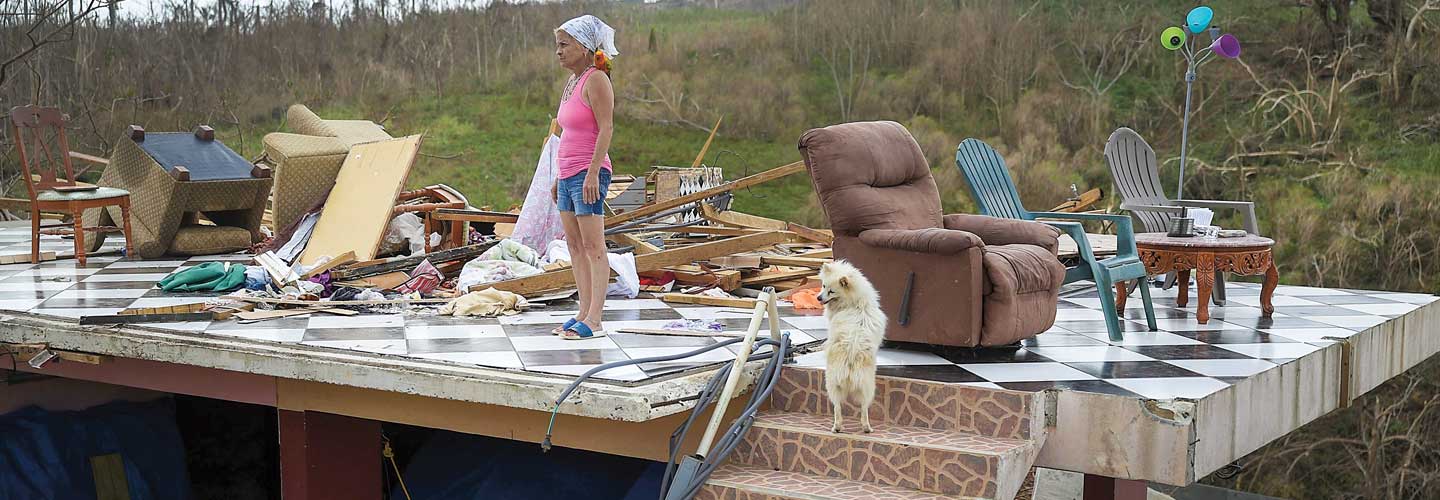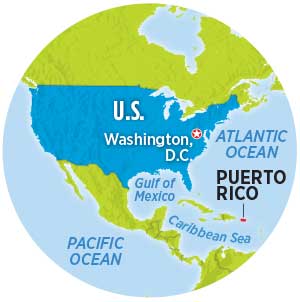
A resident of Corozal, Puerto Rico, stands in what is left of her home in September.
Puerto Rico: What Other Americans Should Know

Hurricane Maria devastated Puerto Rico in late September, leaving many of its 3.4 million residents desperately seeking safe drinking water, food, and shelter. Nearly the entire island was without electricity—and was expected to remain that way for months. The total damage to Puerto Rico, which already had a struggling economy, is estimated to be between $45 billion and $95 billion.
In the wake of the catastrophe, many people have questions about Puerto Rico. For example, some people do not realize that the Caribbean island is part of the United States. A new poll found that only 54 percent of Americans know that Puerto Ricans are Americans too. Read on for answers to questions you might have about Puerto Rico.
1. Are Puerto Ricans American citizens?
Yes. Under the Immigration and Nationality Act of 1940, people born in Puerto Rico have the same birthright U.S. citizenship as people born in the 50 states. As citizens, Puerto Ricans can travel to the U.S. mainland without a passport.
Governor Ricardo A. Rosselló of Puerto Rico emphasized Puerto Ricans’ citizenship status when he pleaded for federal aid after Hurricane Maria. “Puerto Rico, which is part of the United States, can turn into a humanitarian crisis,” he said. “To avoid that, recognize that we Puerto Ricans are American citizens.”
2. Why isn’t Puerto Rico a U.S. state?
Many Puerto Ricans are in favor of statehood. Some say becoming a state would boost the island’s failing economy. In a June
3. What is Puerto Rico’s relationship to the United States?
The U.S. acquired Puerto Rico as a territory after the Spanish-American War (1898). In 1952, Puerto Rico became a U.S.
Like a state, the island has an elected legislature and a governor. It also has a delegate in the U.S. House of Representatives. The delegate can serve on committees, introduce bills, and suggest amendments, but cannot vote on laws. Puerto Rico has no representation in the U.S. Senate.
4. How many Puerto Ricans live in the 50 states?
About 5.4 million, more than live on the island itself. Migration to the U.S. mainland started around 1910 and exploded after World War II (1939-1945). The movement has increased in recent years, as Puerto Rico struggles with poverty and unemployment. From 2006 to 2015, more than 10 percent of Puerto Rico’s population left the island for the mainland. New York, Florida, and New Jersey are home to the most Puerto Ricans.
5. Can people in Puerto Rico vote for president?
No. Puerto Ricans cannot vote in general U.S. presidential elections unless they establish residency in one of the 50 states. They can, however, vote in primaries to help choose U.S. presidential candidates.
Adapted from The New York Times
CORE QUESTION: How might becoming a U.S. state benefit Puerto Ricans? Cite the text and explain your answer.
HOW TO HELP
Donate to people affected by Hurricane Maria at unicefusa.org. Funds provide water-purification tablets, soap, and other essentials to families in need.
